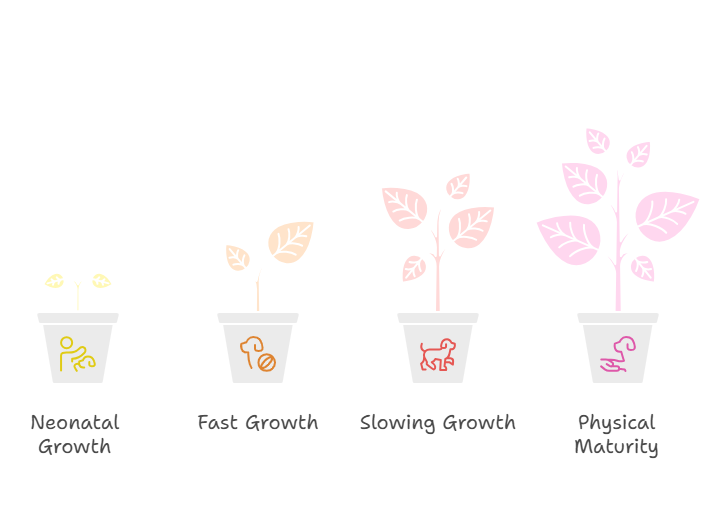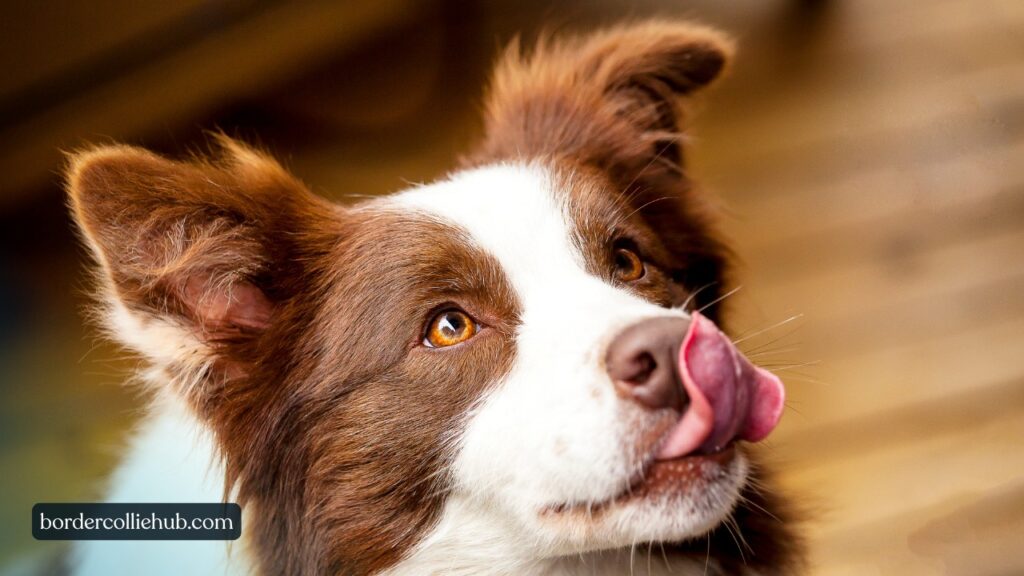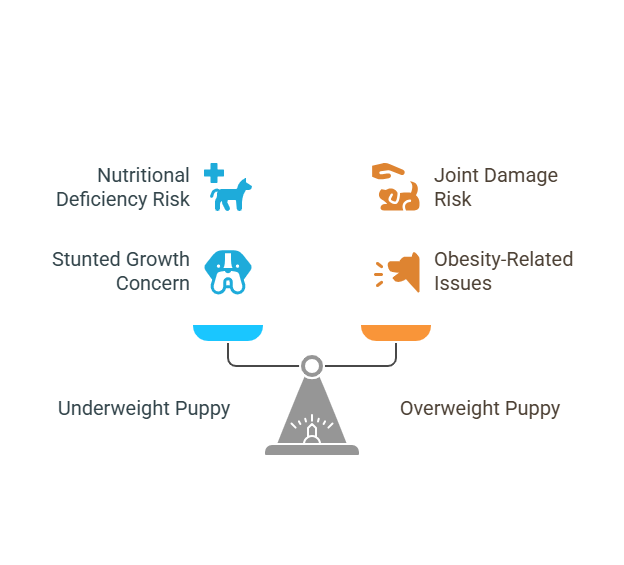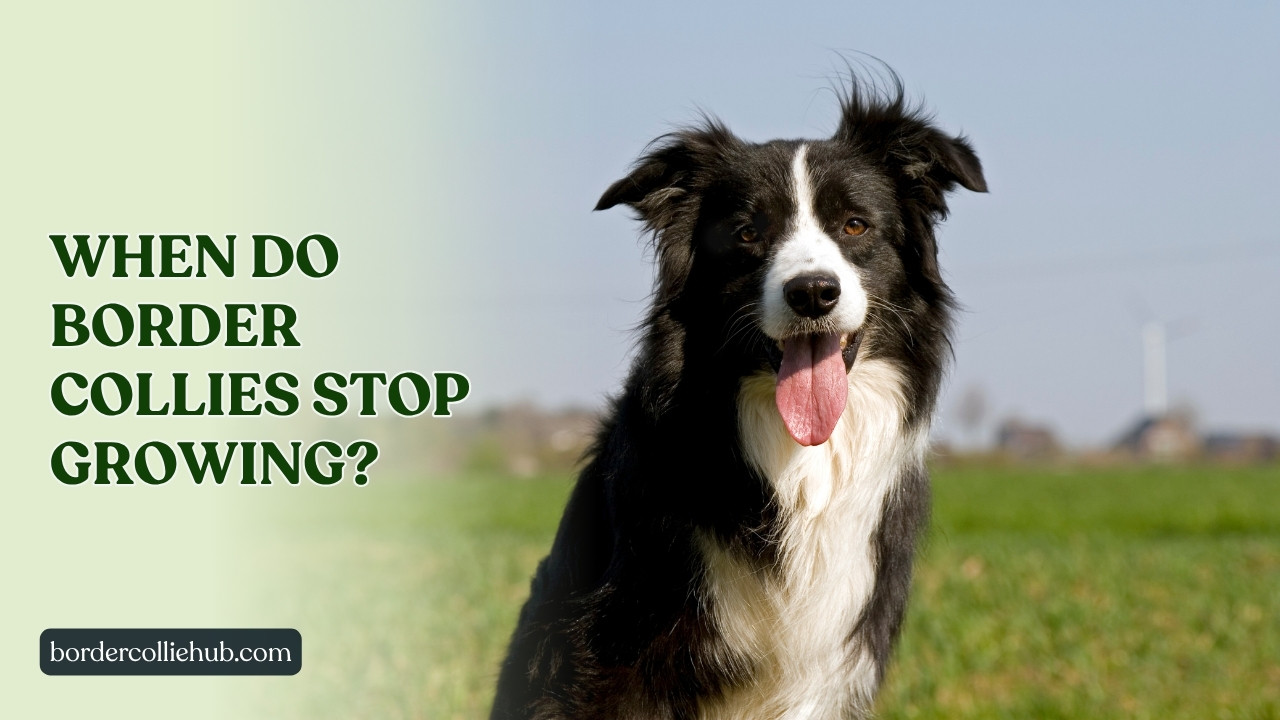Border Collies usually stop growing between 12 and 18 months old. Most of their height and weight develop by their first birthday, but some may fill out and mature mentally a bit later.
Border Collies are smart, active dogs loved by many. But as a new owner, you might wonder, “When will my pup stop growing?” It’s normal to feel unsure because puppies grow fast, then slow down, and it’s hard to tell when they are fully grown. If you want clear, easy answers about your Border Collie’s growth and how to care for them, you’re in the right place. In this article, we’ll explain how Border Collies grow, what affects their size, and how to know when they’ve reached full maturity. Let’s walk through each stage with simple facts and helpful tips.
Border Collie Development
Puppy to Adult: An Overview of Growth Stages
Border Collies grow quickly in their first year but don’t reach full maturity until about 18 months. Their growth can be split into four main stages: neonatal (birth to 3 weeks), puppy (3 weeks to 3 months), juvenile (3 to 6 months), and adolescent (6 to 18 months). During the neonatal stage, puppies are small and fragile, relying on their mother for nutrition and warmth. The puppy stage is when they grow fastest, gaining weight and learning social skills.
From 3 to 6 months, Border Collies continue to grow but at a slower rate. They also start developing their strong muscles and coordination. The adolescent stage, from 6 to 18 months, is when growth slows significantly. Most dogs will reach their full height during this time but might still fill out in weight and develop mentally.
Understanding these stages helps owners provide the right care and exercise at the right time. For detailed breed growth stages, the American Kennel Club offers useful guides: AKC Border Collie Breed Info.
Physical vs. Mental Maturity in Border Collies
Physical growth and mental maturity happen at different speeds. While your Border Collie may reach its full size by 12 to 18 months, mental development can continue for longer. Border Collies are highly intelligent and energetic dogs. They often need mental stimulation even after they stop growing physically.
Physical maturity means your dog has reached its adult height and weight, but mental maturity involves their behavior and emotional control. A Border Collie may still act like a puppy at 2 years old, showing playful or excitable behavior. Mental maturity usually happens between 2 and 3 years of age.
Knowing this helps owners manage training and expectations. For advice on Border Collie behavior, resources like TheSprucePets provide expert tips: Border Collie Behavior.
Border Collie Growth Timeline by Age

0–3 Months: Neonatal and Early Puppy Growth
In the first three months, Border Collie puppies grow rapidly. Their weight can double every week during the first month. Feeding should focus on high-quality puppy food to support strong bones and brain development. Socialization also begins here, which is crucial for healthy mental growth.
4–6 Months: Fast Growth and Size Increase
Between four and six months, your puppy will grow a lot but not as fast as in the first three months. Their muscles become stronger, and they gain coordination. Owners should increase playtime but avoid heavy exercise to protect growing joints.
7–12 Months: Slowing Growth & Developmental Refinement
Growth slows during this period. Most Border Collies reach close to their adult height by 10 to 12 months, but their weight can still increase as they fill out their frame. Behaviorally, this stage is like teenage years in humans—sometimes they test limits and need consistent training.
12–18 Months: Reaching Physical Maturity
Border Collies typically finish their physical growth between 12 and 18 months. At this point, they have reached their full height and most of their adult weight. Owners can start introducing more intense exercise while maintaining good nutrition.
Border Collie Growth Chart by Age, Weight, and Height
| Age (Months) | Avg. Weight (Male) | Avg. Weight (Female) | Avg. Height (Male) | Avg. Height (Female) | Notes |
|---|---|---|---|---|---|
| 0–3 | 5–15 lbs | 5–13 lbs | 6–12 inches | 6–11 inches | Rapid growth phase |
| 4–6 | 20–35 lbs | 18–30 lbs | 12–16 inches | 11–15 inches | Muscle and coordination |
| 7–12 | 30–45 lbs | 25–40 lbs | 16–20 inches | 15–19 inches | Nearing adult size |
| 12–18 | 35–50 lbs | 30–45 lbs | 18–22 inches | 17–21 inches | Full physical maturity |
Note: Individual dogs may vary. For breed standards, see AKC Border Collie Breed Standard.
Factors That Influence Border Collie Growth
Genetic Lineage and Breed Standards
Genetics play a big role in your Border Collie’s size. Puppies from strong working lines may differ from those bred for show or pets. Some lines are naturally larger or more muscular. Knowing your dog’s lineage helps set realistic expectations about growth.
Breed standards provide typical size ranges, but individual dogs can fall outside these. If you want to learn more about breed standards, the American Kennel Club is a trusted source.
Nutrition and Feeding Patterns
Proper nutrition fuels healthy growth. High-quality puppy food rich in protein, vitamins, and minerals supports bones and muscles. Overfeeding can lead to obesity, while underfeeding can stunt growth. Feeding schedules should match the puppy’s age and activity level.
Consult your vet to select the best food and feeding routine. The Royal Society for the Prevention of Cruelty to Animals (RSPCA) offers excellent nutritional advice: RSPCA Puppy Nutrition Guide.
Exercise and Physical Activity Levels
Exercise helps build muscle and keeps joints healthy but should be balanced. Too much running or jumping can harm young puppies because their bones and joints are still developing. Short play sessions and gentle walks are best for puppies under 6 months.
After 12 months, Border Collies can handle more intense exercise. Regular activity also supports mental health and reduces destructive behavior.
Spaying and Neutering Impact on Growth
Spaying or neutering your Border Collie can affect growth. Some studies show neutered dogs may grow slightly taller because their growth plates close later. However, the size difference is usually small and not harmful.
Discuss timing of spaying or neutering with your vet to optimize your dog’s health and development.
How to Tell If Your Border Collie Has Stopped Growing?

Physical Indicators of Growth Completion
You can usually tell if your Border Collie has stopped growing by checking a few physical signs. The most obvious is their height and weight. When your dog no longer seems to get taller or heavier for several months, it likely means growth is complete. Another sign is the fullness of their muscles and bone structure. A mature Border Collie will have a well-defined body without the lankiness typical of puppies.
You can also observe their teeth. By about 12 to 18 months, a Border Collie’s adult teeth should be fully grown in, which often lines up with the end of rapid growth. Lastly, their coat changes from the soft puppy fur to a thicker, more mature coat.
If you want to track growth yourself, simple measuring tools like a dog height chart or a weight scale can help. For detailed tips on how to measure your dog properly, check out resources like the AKC guide to measuring dogs.
Behavioral and Mental Maturity Clues
Even after physical growth slows, your Border Collie might still act like a young dog. Mental maturity can take longer. Signs of mental maturity include calmer behavior, better focus, and fewer bursts of hyperactivity. Your dog will also show improved impulse control and respond better to training.
Puppy-like behaviors such as chewing or jumping may lessen as your dog matures mentally. Usually, this happens between 2 and 3 years of age. Understanding this can help you stay patient and adjust training methods as your dog grows.
For help with Border Collie behavior and training, PetMD offers practical advice.
Male vs. Female Border Collie Growth Patterns
Male Border Collies are generally larger and heavier than females. On average, males weigh between 35 and 50 pounds and stand about 18 to 22 inches tall. Females usually weigh 30 to 45 pounds and measure 17 to 21 inches in height. However, these ranges can overlap.
Growth timelines are similar for both sexes, but males may take a bit longer to fully fill out their frame. Females often reach physical maturity a little earlier. Hormonal differences, especially if dogs are neutered or spayed, can also affect growth patterns.
These differences are important when planning exercise and nutrition. Males might need more calories and longer training sessions as they mature. For breed standard details by sex, see the American Kennel Club Border Collie profile.
Growth Concerns: Is Your Border Collie Too Small or Too Large?

Underweight or Overweight Puppy Concerns
If your Border Collie is much smaller or larger than expected, it can be a cause for concern. Underweight puppies may not get enough nutrition or could have health problems. Overweight puppies risk joint damage and other issues.
To check your dog’s weight, feel along their ribs. You should feel them easily but not see them sticking out. A balanced diet and regular vet checkups help keep growth on track.
Stunted Growth: When to See a Vet
Sometimes, Border Collies grow slowly due to genetics, illness, or poor nutrition. Stunted growth means your dog is smaller than normal for their age and breed. If you notice your puppy isn’t gaining weight, has low energy, or shows other health problems, contact your veterinarian.
Early diagnosis can prevent long-term issues. Vets may run tests to rule out infections, parasites, or hormonal imbalances.
Growth Problem Signs Table
| Concern | Possible Cause | What to Do |
|---|---|---|
| Too small for age | Poor nutrition, illness | Visit vet, adjust diet |
| Too large for age | Overfeeding, genetics | Consult vet, monitor exercise |
| Slow weight gain | Parasites, disease | Vet check, treatment |
| Lack of energy | Illness, poor diet | Vet exam, improve nutrition |
Helpful Resources & Tools
To support your Border Collie’s growth and health, reliable resources are essential. Internal articles on feeding, exercise, and health provide targeted advice that matches your dog’s needs at every stage.
Suggested internal links to add for reader benefit include:
- How to Feed a Border Collie Puppy
- Top Exercises for Energetic Border Collies
- Border Collie Health and Life Expectancy
For trustworthy external information, these sources offer expert guidance on breed traits, nutrition, and care:
- American Kennel Club (AKC) — Comprehensive breed details and standards.
- PetMD Border Collie Breed Info — Health and behavior advice from vets.
- Vetstreet Border Collie Growth Facts — Insights on growth, health, and training.
Using these resources ensures your article gains credibility and helps readers find in-depth, accurate information.
FAQs
How big should a 6-month-old Border Collie be?
At six months, most Border Collies weigh between 20 and 35 pounds. Their height usually ranges from 12 to 16 inches. They are still growing but should look strong and coordinated. Proper nutrition and exercise help maintain healthy growth.
Do Border Collies grow after 1 year?
Yes, Border Collies often grow in height and weight until around 12 to 18 months. Most reach full height by one year but continue to fill out and develop muscle tone after that. Mental maturity can take longer, often up to 2 or 3 years.
Are female Border Collies smaller than males?
Typically, females are slightly smaller and lighter than males. Females weigh around 30 to 45 pounds, while males weigh 35 to 50 pounds. Heights also differ slightly, with females being 17 to 21 inches tall and males 18 to 22 inches.
What’s the average full-grown weight of a Border Collie?
A fully grown Border Collie usually weighs between 30 and 50 pounds. Weight depends on gender, genetics, diet, and activity level. Maintaining a healthy weight is important for joint health and energy.
Can poor nutrition stunt Border Collie growth?
Yes, poor nutrition can slow growth and cause health problems. Border Collie puppies need a balanced diet rich in protein, vitamins, and minerals. Feeding low-quality food or irregular meals may stunt their growth.
Is my Border Collie done growing if he looks skinny?
Not necessarily. Some Border Collies are naturally lean. However, if your dog looks underweight with visible ribs and lacks energy, check with a vet. Proper diet and health checks ensure healthy growth.
Conclusion: When Do Border Collies Stop Growing?
Border Collies usually stop growing physically between 12 and 18 months. Most reach their adult height around one year but continue to fill out and mature mentally beyond that. Growth depends on genetics, nutrition, exercise, and overall health. Monitoring your dog’s size, behavior, and development helps you provide the right care.
Using growth charts, understanding male and female differences, and consulting trustworthy resources keeps your Border Collie happy and healthy. For more on Border Collie care, check the AKC Border Collie page and stay connected with your vet.
